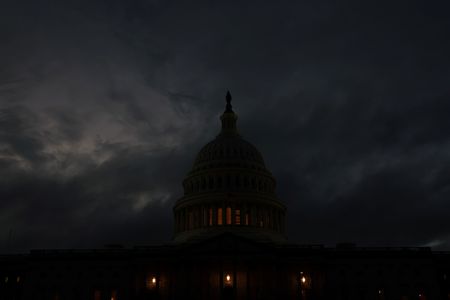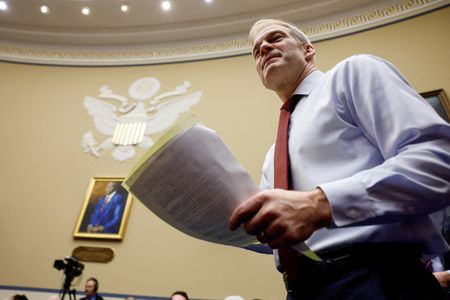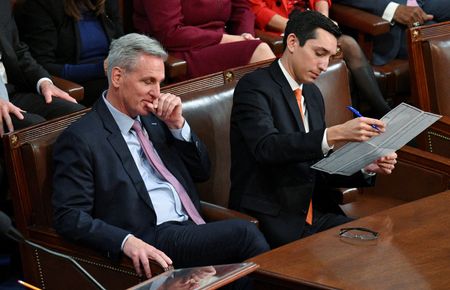By Jason Lange, Gram Slattery and David Morgan
WASHINGTON (Reuters) – House Freedom Caucus lawmakers taking a hard line against raising the U.S. government’s $31.4 trillion debt ceiling rely heavily on small donors to fund their campaigns, a Reuters analysis found, shielding them from business lobby pressure to avoid a default.
Members of the House Freedom Caucus, a secretive group of at least 37 conservative Republicans, got close to 40% of their campaign funds from smaller donations during the 2022 election cycle, the analysis of financial disclosures found, compared to close to 20% for the rest of the party’s House members.
That financial independence from traditional power brokers could make it even harder for Republican Speaker Kevin McCarthy to maintain control over members of his party in a closely divided House and further complicate his negotiations with Democratic President Joe Biden over raising the government’s borrowing limit.
House Freedom Caucus members, who want to shrink the role of government, are demanding reductions in government spending. Biden opposes putting conditions on a debt ceiling increase, which is needed to cover outlays and tax cuts already approved by Congress.
“The most conservative of us will only support a responsible adjustment of the debt ceiling if it’s accompanied by meaningful and serious fiscal reform,” Representative Clay Higgins, a Freedom Caucus member from Louisiana, said in an interview.
GRAPHIC: The House Freedom Caucus relies heavily on small donors (https://www.reuters.com/graphics/USA-DEBT/FREEDOM-CAUCUS/zgpobklqmvd/graphic.jpg)
Some Freedom Caucus members leaned especially hard on small donors; U.S. Representative Marjorie Taylor Greene of Georgia got close to 70% of her 2022 campaign fund from people giving $200 or less, Reuters found. Her office did not respond to requests for comment.
U.S. Representative Jim Jordan, who is from Ohio, got close to 60% of his funds from small donors while Representative Andy Biggs, who is from Arizona, brought in close to 50%.
“We’ve got – I forget how many hundred-thousand donors we have, regular people all across the country who believe in the values and principles that make our country great,” Jordan said.
Biggs did not respond to request for comment.
The Freedom Caucus members also raised significant sums from larger donors and traditional political fundraising committees.
Reuters reviewed mandatory financial disclosures to the Federal Election Commission in which campaigns declare funding from donors giving $200 or less. The analysis did not examine in detail other funding sources such as groups controlled by companies and lobby organizations, or independent spending by Super PACs.
Unlike other congressional caucuses, the House Freedom Caucus doesn’t disclose its membership, a practice that began in 2015. Membership is by invitation only which helps keep the group rigidly conservative.
Reuters identified at least 37 members of the House Freedom Caucus by reviewing public statements in which they identified themselves as members, or by asking their offices.
Small-dollar fundraising helps lawmakers buck pressure from traditional power brokers and corporate groups, said Ian Vandewalker, a campaign finance expert at New York University’s Brennan Center.
“The ability to raise money outside those structures means you have freedom to thumb your nose at those structures,” Vandewalker said.
Some hardline Republicans outside the group also rely heavily on small donors. Representative Matt Gaetz of Florida, one of several hardliners who confirmed they are not members of the caucus, took in close to 60% of his campaign fund from small donors. Gaetz’s office did not respond to a request for comment.
Small-dollar donations – often courted via provocative emails and social media posts – also help reinforce the hardline brands of some lawmakers.
“A controversial House member who might have struggled with fundraising 20 years ago is now going to thrive,” said Alex Conant, a Republican strategist who worked on Republican U.S. Senator Marco Rubio’s 2016 presidential campaign.
Small-donor fundraising for Democrats as well as Republicans has grown rapidly over the last decade, with campaigns using email and social media posts to solicit contributions nationwide.
Many political observers praise the expansion of small-dollar fundraising for countering the influence of deep-pocketed interest groups and for financing campaigns in many competitive races.
DEFAULT COULD RISK RECESSION
The Treasury Department has warned Congress that failure to raise the legal cap on federal debt by early June would risk a default in which Washington ceased to pay all its bills.
Some economists warn a default would trigger a recession as the U.S. government missed payments on everything from Social Security checks for seniors to soldiers’ wages.
The 2011 debt-ceiling fight took the United States to the brink of default. Rating agency Standard & Poor stripped the government of its top-tier credit rating. The S&P 500 index lost about 15% of its value, according to a Goldman Sachs’ research note.
While McCarthy has pledged that the government won’t default, the Republicans’ narrow 222-212 majority has given outsized power to the Freedom Caucus.
Prominent members of the Freedom Caucus have so far downplayed corporate lobbyists’ warnings that brinksmanship over the debt ceiling could hurt the economy.
“What will damage the economy is what we’ve seen the last two years: record spending, record inflation, record debt. We already know that’s damaging the economy,” said Jordan, a founding member of the group.
‘I AIN’T LISTENING’
Freedom Caucus members are among the most conservative members of Congress, according to their voting records.
They are also further to the right than the Tea Party Republicans who led the 2011 debt-ceiling standoff, a Reuters analysis found.
The analysis used a metric developed by political scientists and widely used in academic research known as DW-Nominate, which uses congressional voting records to score lawmakers on a scale from least to most conservative.
Yet some corporate lobbyists expect Freedom Caucus members will not be in a position to dictate the outcome once serious negotiations about raising the debt limit get underway.
Freedom Caucus member Chip Roy, a U.S. Representative for Texas, said no one from the business community has approached him on the debt ceiling because they probably understand his fiscal policy views.
“If you want me to keep spending money I don’t have so you can sit here and sell me a bunch of crap about default, I ain’t listening,” Roy said.
Indeed, as the June deadline approaches, business groups are more likely to focus on building a coalition of centrist Republicans and Democrats who control the U.S. Senate, some lobbyists said.
The likely winning approach in Congress “tends to be from the middle out,” said Neil Bradley, a U.S. Chamber of Commerce vice president who previously worked for Republican leadership in the U.S. House of Representatives.
Other business lobbyists are bracing for a bumpy ride.
“We try to educate our members and folks to help them understand how the process works,” said Steve Stivers, a former Tea Party Republican who now heads the Ohio Chamber of Commerce. “I don’t pretend that it’s going to happen magically before any kind of deadline or full pressure situation.”
(Reporting by Jason Lange and Gram Slattery, additional reporting by Andy Sullivan, David Morgan, Richard Cowan and David Lawder; Editing by Scott Malone and Suzanne Goldenberg)




